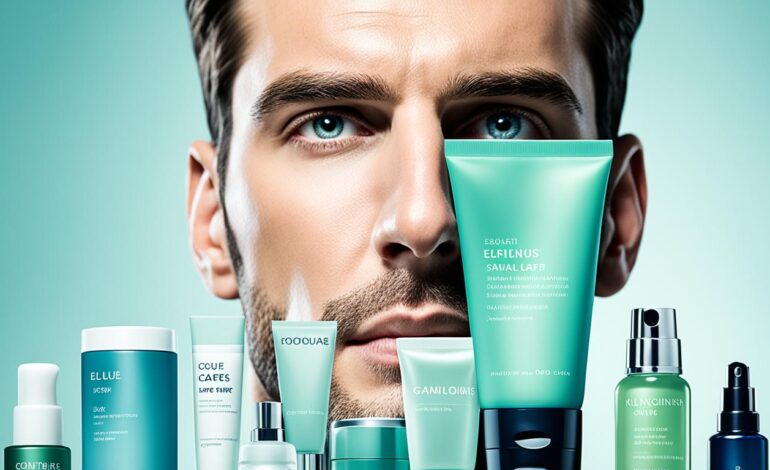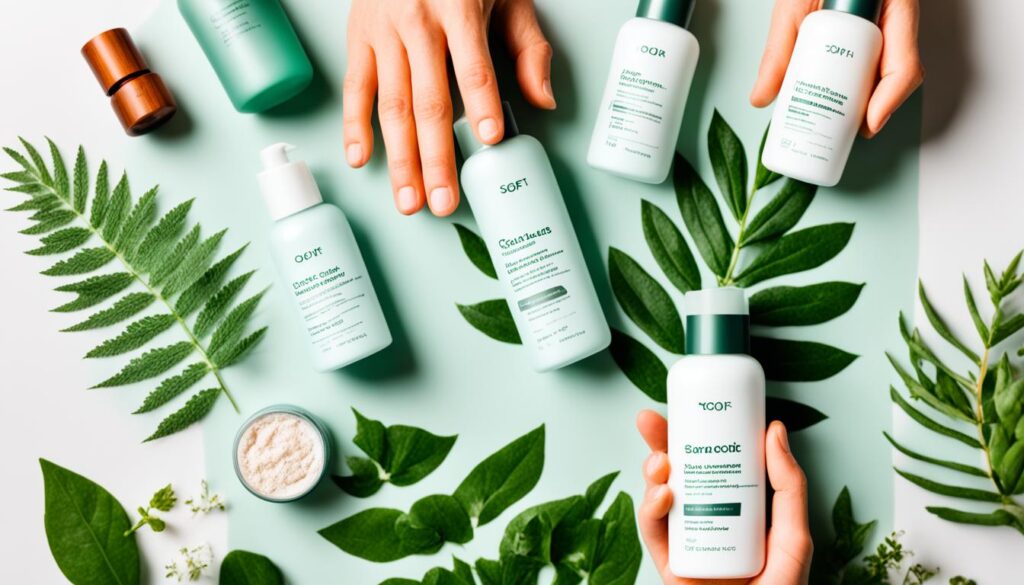Expert Tips For Flawless Skin Care For Men

Tips For Flawless Skin Care For Men : Achieving clear and flawless skin is a concern for men as much as it is for women. Men’s skin requires special attention and care to maintain its health and appearance. In this article, we will provide expert tips and advice on creating a skincare routine specifically designed for men, along with essential skincare practices and products.
It is important for men to assess their current skin condition and identify any specific skin issues or concerns they may have. This allows them to choose the right products and establish an effective skincare routine that addresses their individual needs.
Key Takeaways:
- Men’s skin requires specific care and attention to maintain its health and appearance.
- Assess your skin condition and identify any specific issues or concerns you may have.
- Choose skincare products and establish a routine tailored to your skin type and needs.
- Follow essential skincare practices such as cleansing, exfoliating, moisturizing, and using sunscreen.
- Adopt healthy lifestyle habits, including a balanced diet, regular exercise, and adequate sleep, for overall skin health.
Cleanse
Cleansing your skin is an essential step in achieving healthy skin. Men should cleanse their face twice a day to remove dirt, oil, and environmental pollutants. It is important to choose a gentle cleanser that suits your skin type and restores moisture without causing dryness or tightness. Cleansing helps prevent flaking, itchiness, dryness, and acne.
Also Read : 10 Natural Skincare Gems For Glowing Skin
When cleansing your skin, it’s important to use a cleanser specifically formulated for your skin type. For oily skin, look for cleansers that help control sebum production and reduce pore congestion. If you have dry or sensitive skin, opt for a hydrating cleanser with soothing ingredients to nourish and protect the skin barrier.
Also Read : Sunscreen Essentials For Healthy, Protected Skin Every Day
Remember to cleanse your face in the morning and before bed to remove impurities that accumulate throughout the day.
Here are some key benefits of regular cleansing:
- Removes dirt, oil, and environmental pollutants
- Prevents clogged pores and acne breakouts
- Improves skin texture and tone
- Enhances the absorption of other skincare products
Also Read : Expert Tips For Glowing Skin All Year Round
The Importance of Choosing the Right Cleanser
Choosing the right cleanser for your skin type is crucial to ensure effective cleansing without causing any irritation or dryness. Here are some tips to keep in mind:
- For oily or acne-prone skin, look for cleansers that contain salicylic acid or benzoyl peroxide to help combat breakouts.
- If you have sensitive skin, opt for a gentle, fragrance-free cleanser that is formulated to minimize irritation.
- Dry skin can benefit from creamy or oil-based cleansers that help replenish moisture.
- Combination skin may require a cleanser that balances oil production and provides hydration.
Also Read : 10 Easy DIY Fixes For Dry Skin At Home
Remember to massage the cleanser onto damp skin using gentle, circular motions. Rinse thoroughly with lukewarm water and pat your skin dry with a clean towel. Avoid scrubbing or using harsh exfoliants, as they can strip the skin of its natural oils and cause inflammation.
Also Read : 10 Unexpected Reasons For Dry Skin
Proper cleansing sets the foundation for a healthy skincare routine and prepares your skin to better absorb the benefits of the products you apply afterward.
| Benefits of Cleansing | How to Choose the Right Cleanser |
|---|---|
| Removes dirt, oil, and environmental pollutants | Consider your skin type and specific concerns |
| Prevents clogged pores and acne breakouts | Look for ingredients like salicylic acid for oily skin |
| Improves skin texture and tone | Opt for gentle cleansers for sensitive skin |
| Enhances the absorption of other skincare products | Avoid harsh exfoliants and scrubbing motions |
Exfoliate

Exfoliating is a vital step in any skincare routine as it helps remove dead skin cells and unclog pores, promoting a smoother and healthier complexion. Men should make exfoliation a regular part of their skincare routine, ideally exfoliating once or twice a week. By incorporating exfoliation into their regimen, men can effectively address various skin concerns such as ingrown hairs, uneven skin texture, and dullness.
“Exfoliating allows for deeper penetration of other skincare products and helps improve their efficacy.”
To exfoliate effectively, it is important to choose the right exfoliant based on your skin type. There are two main types of exfoliants: chemical exfoliants and physical scrubs. Chemical exfoliants contain alpha-hydroxy acids (AHAs) and beta-hydroxy acids (BHAs), which work by dissolving dead skin cells and promoting cell turnover. AHAs are water-soluble and are best for targeting the surface of the skin, while BHAs are oil-soluble and can penetrate deeper into the pores, making them suitable for acne-prone and oily skin.
On the other hand, physical scrubs contain small particles that physically remove dead skin cells through gentle abrasion. While physical scrubs can be effective for many, they may not be suitable for those with sensitive skin as they can cause irritation and redness.
When exfoliating, it is important to apply gentle pressure and avoid scrubbing too vigorously, as this can damage the skin and cause inflammation. After exfoliating, always moisturize your skin to replenish moisture and maintain its natural barrier.
Benefits of Exfoliation:
- Removes dead skin cells, revealing a brighter complexion
- Unclogs pores and helps prevent breakouts and blackheads
- Improves skin texture and smoothness
- Enhances the absorption of skincare products
- Reduces the appearance of fine lines and wrinkles
| Chemical Exfoliants | Physical Scrubs |
|---|---|
| – Alpha-hydroxy acids (AHAs) | – Small particles for gentle abrasion |
| – Beta-hydroxy acids (BHAs) | – Removes dead skin cells physically |
| – Dissolves dead skin cells and promotes cell turnover | – May not be suitable for sensitive skin |
| – Targets surface of the skin | |
| – Suitable for oily and acne-prone skin |
Remember, exfoliation should be a gentle and regular part of your skincare routine. By selecting the right exfoliant and using it consistently, you can achieve smoother, more radiant skin.
Moisturize

Moisturizing is an essential step for maintaining healthy skin, regardless of your skin type. Even if you have oily or sensitive skin, moisturization is crucial to provide hydration and retain moisture. By using the right moisturizer, you can keep your skin soft, supple, and protected from dryness caused by harsh cleansers and exfoliators.
For individuals with oily skin, it’s important to choose water-based and oil-free moisturizers that won’t clog pores or add excess oil to the skin’s surface. Look for lightweight formulas that provide hydration without leaving a greasy residue. These moisturizers offer the benefits of moisturization without exacerbating oily skin.
Recommended Moisturizers for Oily Skin
| Product | Key Ingredients | Benefits |
|---|---|---|
| Neutrogena Hydro Boost Water Gel | Hyaluronic Acid | – Lightweight and oil-free formula – Provides intense hydration – Absorbs quickly into the skin |
| CeraVe PM Facial Moisturizing Lotion | Niacinamide, Ceramides | – Non-comedogenic and oil-free – Restores the skin’s natural barrier – Reduces redness and irritation |
On the other hand, if you have sensitive skin, gel moisturizers can be a great option. These formulations are gentle on the skin and provide the necessary moisture without causing irritation or redness. Look for products that are specifically formulated for sensitive skin and free from harsh fragrances and additives.
Recommended Moisturizers for Sensitive Skin
| Product | Key Ingredients | Benefits |
|---|---|---|
| Aveeno Ultra-Calming Daily Moisturizer | Feverfew Extract, Oat Extract | – Hypoallergenic and fragrance-free – Calms and soothes sensitive skin – Provides long-lasting hydration |
| Cetaphil Daily Hydrating Lotion | Hydrolyzed Hyaluronic Acid, Sunflower Seed Oil | – Lightweight and non-greasy formula – Moisturizes and nourishes sensitive skin – Restores the skin’s natural moisture barrier |
Remember to apply moisturizer to cleansed skin in gentle, upward motions. Focus on areas that tend to be drier or more prone to oiliness. Regular moisturization will help balance your skin’s moisture levels and keep it nourished and protected throughout the day.
Incorporating moisturization into your skincare routine is vital for maintaining healthy and hydrated skin. Whether you have oily or sensitive skin, there are moisturizers specifically designed to meet your skin’s unique needs. By incorporating the right moisturizer into your daily regimen, you can achieve a well-hydrated, glowing complexion that feels and looks its best.
Use Sunscreen

Protecting your skin from harmful UV rays is crucial in maintaining its health and preventing skin cancer. Sunscreen is an essential tool in this fight against sun damage. It acts as a protective shield, reducing the harmful effects of UV radiation on the skin.
Men should make it a habit to apply a broad-spectrum sunscreen with an SPF of 30 or higher every day, regardless of the weather. Even on cloudy days, UV rays can penetrate through the clouds and cause damage to the skin. By applying sunscreen consistently, you can reduce the risk of sunburn, premature aging, dark spots, and the development of skin cancer.
To ensure maximum protection, make sure to apply sunscreen to all exposed areas of the skin, including your ears, neck, and lips. These areas are often overlooked but are just as susceptible to sun damage as the rest of your body.
Sunscreen is available in various forms such as lotions, creams, gels, and sprays. Choose a formula that suits your skin type and preference. If you have oily skin, opt for a lightweight, oil-free sunscreen. For sensitive skin, look for a hypoallergenic and fragrance-free option. Regardless of the formula, make sure it provides broad-spectrum protection, meaning it guards against both UVA and UVB rays.
The Importance of SPF
The Sun Protection Factor (SPF) indicates the level of protection a sunscreen provides against UVB rays. It is recommended to use a sunscreen with an SPF of 30 or higher. The higher the SPF, the greater the protection.
It’s important to note that SPF only measures the sunscreen’s ability to protect against UVB rays, which primarily cause sunburns. UVA rays, on the other hand, can penetrate deeper into the skin and contribute to premature aging and skin cancer. Look for a broad-spectrum sunscreen that offers protection against both UVA and UVB rays to safeguard your skin from all harmful effects of the sun.
| SPF | Level of Protection |
|---|---|
| SPF 15 | Minimum recommended protection |
| SPF 30 | Provides high protection |
| SPF 50 | Offers very high protection |
| SPF 50+ | Maximum available protection |
Remember to reapply sunscreen every two hours, especially if you’re outdoors or engaging in activities that cause excessive sweating or water exposure. Sunscreen should be an integral part of your daily skincare routine, along with cleansing, moisturizing, and exfoliating.
“Sunscreen is like your skin’s armor. It shields you from the harmful effects of the sun and helps maintain a youthful complexion.” – Dermatologist Dr. Mia Sanders
By incorporating sunscreen into your daily skincare regimen, you are taking a proactive step towards protecting your skin and preventing the damaging effects of UV rays. Don’t let sunburns and skin cancer cast a shadow over your life. Embrace the power of sunscreen and make it your skin’s best friend.
Stay Hydrated

Proper hydration is essential for maintaining healthy and nourished skin. Water plays a crucial role in hydrating the skin, promoting skin moisture, and preventing dehydration. When you drink enough water, it helps flush out toxins from your body and skin, renewing your skin cells and promoting a clear complexion.
For men, it is recommended to drink 8-10 glasses of water per day to keep your skin soft, glowing, and free from common skin disorders caused by dehydration. Dehydration can lead to dryness, flakiness, and even aggravate skin conditions like eczema, psoriasis, and acne.
“Water is the driving force of all nature.” – Leonardo da Vinci
To maintain optimal hydration levels, make it a habit to stay hydrated throughout the day. Carry a reusable water bottle with you and take regular sips to ensure you meet your daily water intake. Additionally, include fruits and vegetables with high water content, such as watermelon, cucumbers, and oranges, in your diet.
Remember: Hydrated skin is healthy skin. Drink water regularly to maintain proper hydration and support your skin’s natural functions.
| Benefits of Hydration | Consequences of Dehydration |
|---|---|
|
|
Tips for Staying Hydrated
To ensure you stay hydrated and maintain optimal skin moisture levels, consider the following tips:
- Carry a water bottle with you throughout the day, and make a conscious effort to drink water regularly.
- Set reminders on your phone or use apps to track your daily water intake.
- Include hydrating foods in your diet, such as water-rich fruits and vegetables.
- Avoid excessive caffeine and alcohol consumption, as they can contribute to dehydration.
- Use a humidifier in your home or workplace to add moisture to the air.
Establish a Proper Skincare Routine

Building a proper skincare routine is crucial for achieving healthy and glowing skin. Men should personalize their skincare routine based on their skin type and concerns. By implementing a consistent routine, they can effectively address specific skin issues and maintain the overall health of their skin.
Personalization
The key to a successful skincare routine is personalization. Every individual has unique skin characteristics and concerns that require tailored solutions. It is important for men to identify their skin type, whether it be oily, dry, combination, or sensitive, in order to select the appropriate products and treatments.
Understanding specific skin concerns, such as acne, aging, or hyperpigmentation, also plays a significant role in personalizing the skincare routine. This allows men to target problem areas and use specialized products or actives to address those issues effectively.
Cleansers
Cleansing is the foundation of any skincare routine. Men should choose cleansers that are suitable for their skin type and concerns. For oily or acne-prone skin, a gel-based or foaming cleanser can help remove excess oil and unclog pores. Gentle cream or milk cleansers are ideal for dry or sensitive skin, as they provide hydration while cleansing.
Here is a list of popular cleansers for different skin types:
| Cleanser | Skin Type |
|---|---|
| CeraVe Foaming Facial Cleanser | Oily, Acne-prone |
| Cetaphil Gentle Skin Cleanser | Dry, Sensitive |
| La Roche-Posay Toleriane Hydrating Gentle Cleanser | Dry, Sensitive |
Actives
Actives are powerful ingredients that can address specific skin concerns, such as acne, fine lines, or hyperpigmentation. Men can incorporate actives into their skincare routine to achieve targeted results.
Here are some commonly used actives for different skin concerns:
| Active Ingredient | Skin Concern |
|---|---|
| Salicylic Acid | Acne |
| Retinol | Fine lines, Wrinkles |
| Vitamin C | Hyperpigmentation, Brightening |
Moisturizers
Moisturizing is essential for all skin types, including oily skin. Men should choose a moisturizer that provides adequate hydration without leaving the skin greasy. Lightweight formulas, such as gels or lotions, are suitable for oily and combination skin, while thicker creams are suitable for dry skin.
Here are some popular moisturizers for different skin types:
| Moisturizer | Skin Type |
|---|---|
| Neutrogena Hydro Boost Gel Cream | Oily, Combination |
| CeraVe Moisturizing Cream | Dry, Sensitive |
| La Roche-Posay Toleriane Double Repair Face Moisturizer | Dry, Sensitive |
Sunscreen
Sunscreen is a crucial step in any skincare routine as it protects the skin from harmful UV rays. Men should incorporate a broad-spectrum sunscreen with a minimum SPF 30 into their daily routine. It is important to apply sunscreen generously to all exposed areas of the skin, including the face, neck, ears, and lips.
Here is a list of recommended sunscreens:
| Sunscreen | SPF |
|---|---|
| EltaMD UV Clear Facial Sunscreen | SPF 46 |
| La Roche-Posay Anthelios Melt-In Sunscreen Milk | SPF 60 |
| Neutrogena Ultra Sheer Dry-Touch Sunscreen | SPF 55 |
Exfoliation
Exfoliation aids in removing dead skin cells and unclogging pores, resulting in smoother and brighter skin. Men should exfoliate their skin once or twice a week, depending on their skin’s tolerance. Chemical exfoliants containing AHAs or BHAs are effective in improving skin texture, while physical scrubs can help remove stubborn dead skin cells.
Remember to be gentle when exfoliating to avoid irritating the skin.
Now that you have an understanding of the essential elements of a skincare routine, you can personalize your own routine based on your skin type, concerns, and preferences. Consistency is key in achieving and maintaining healthy skin.
Keep in mind that it’s always a good idea to consult with a dermatologist or skincare professional for personalized advice and recommendations.
Additional Skincare Tips

To achieve clear and healthy skin, men can incorporate the following additional skincare tips into their routine:
- Avoid touching your skin: Regularly touching your face can transfer dirt, oil, and bacteria, leading to breakouts and skin irritation. Be mindful of this and try to avoid touching your face unnecessarily.
- Reduce smoking and alcohol consumption: Smoking and excessive alcohol consumption can have detrimental effects on your skin. They can cause premature aging, dryness, and dullness. Limiting or quitting these habits can significantly improve your skin’s health.
- Follow a healthy diet: A balanced diet rich in antioxidants, vitamins, and minerals can work wonders for your skin. Include plenty of fruits, vegetables, whole grains, and lean proteins in your meals to promote clear and glowing skin.
- Exercise regularly: Regular physical activity not only improves your overall health but also benefits your skin. Exercise boosts blood circulation, which helps deliver essential nutrients to the skin and promotes a healthy complexion.
- Get enough sleep: Adequate sleep plays a vital role in skin rejuvenation. During sleep, the body repairs and regenerates the skin, resulting in a brighter and more refreshed appearance. Aim for 7-9 hours of quality sleep each night.
By following these additional skincare tips, you can enhance the effectiveness of your skincare routine and achieve healthier, more radiant skin.
Remember, taking care of your skin is an ongoing process that requires consistent effort and lifestyle adjustments. Combine these tips with the previous expert advice to create a comprehensive skincare routine tailored to your skin’s needs. Consult with a dermatologist to receive personalized recommendations and treatments, if necessary. With dedication and proper care, you can enjoy clear and flawless skin for years to come.
Conclusion
With the right skincare routine and lifestyle habits, men can achieve clear and flawless skin. By following expert tips such as cleansing, exfoliating, moisturizing, using sunscreen, staying hydrated, establishing a skincare routine, and adhering to additional skincare tips, men can improve the health and appearance of their skin. Personalization and consistency are crucial in maintaining a healthy skincare routine.
Remember, clear skin is achievable with dedication and the right approach. Consult with a dermatologist for personalized advice and treatments if needed. By taking care of your skin, you can enhance your overall appearance and boost your confidence.
So, start implementing these tips today and say hello to a healthier, clearer complexion. Take control of your skincare journey and enjoy the benefits of a well-maintained skincare routine. Your skin deserves the best, and with a little effort, you’ll be well on your way to achieving your skincare goals.
Also Refer : 10 Easy DIY Fixes For Dry Skin At Home
FAQs
Q: How can men get clear skin?
A: Men can achieve clear skin by following a consistent skin care routine, including regular shaving, face washing, and maintaining a healthy diet. It’s important to understand your skin type and address any specific skin concerns like acne or dark circles.
Q: What is the recommended frequency for washing your face?
A: It’s recommended to wash your face twice a day, once in the morning and once before bed, to keep your skin clean and free from dirt and excess oil.
Q: How often should men shave for clearer skin?
A: Men should shave as often as necessary to maintain a clean and groomed appearance tips for men. For some, this may be daily, while for others, it may be every few days.
Q: What are the key steps in a skin care regimen for men?
A: A basic skin care regimen for men should include cleansing the skin, moisturizing to keep it hydrated, and using sunscreen to protect from sun damage. Additionally, incorporating exfoliation and targeted treatments for specific concerns can further improve the skin’s appearance.
Q: How does a healthy diet contribute to clearer skin?
A: Consuming a healthy diet rich in fruits, vegetables, lean proteins, and essential nutrients can contribute to clearer and healthier skin. Avoiding excessive sugar and processed foods can also help prevent skin issues.
Q: What are some common skin care mistakes that can damage your skin?
A: Over-exfoliating, using harsh products, not moisturizing, and neglecting sun protection are common mistakes that can damage the skin and lead to issues like dryness, irritation, and premature aging pimple razor keep skin.
Q: What are some early warning signs of skin problems that men should look out for?
A: Men should be attentive to early warning signs such as changes in moles or skin growths, persistent acne or dark spots, and any unusual changes in the skin’s texture or appearance. Regularly checking for these signs can help in the early detection of potential skin issues
